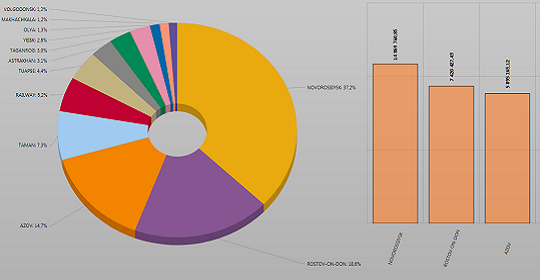Last season, the Russian Federation sent about 68 million tons of grain abroad, of which 60 million tons were wheat, but recently supply volumes have decreased.
This June, grain exports from the Russian Federation fell by about 7%, to 5 million tons, experts say. At the same time, different situations have developed for different types of grains.
For example, wheat shipments remained at last year’s level, about 4.3 million tons.
At the same time, barley supplies decreased by 26% and currently amount to about 385 thousand tons.
Corn exports also dropped by 41% and are now at about 325 thousand tons.
Which countries buy grain from Russia today?
One of the important buyers isEgypt. This country became the main buyer of wheat from Russia in June, the volume of supplies was almost 10% higher than the same value in June last year.
Turkey is in second place in terms of volume of wheat purchases from Russia, but here we are faced with negative dynamics: in June, supply volumes decreased by 60% when compared with the same period last season.
At the same time, wheat supplies toSaudi Arabia, which is in third place, almost doubled.
In addition, Saudi Arabia remains a fairly large buyer of Russian barley. True, supply volumes have recently decreased by 12%.
In addition, the list of countries that are important buyers of agricultural products in the Russian Federation includes Algeria, Yemen, Mozambique, Nigeria, Kuwait, the United Arab Emirates, Libya and Oman, as well as Iran.
Each of these countries has its own characteristics and preferences regarding the structure and volumes of purchased grain.
For example, Iran has long remained an important buyer of Russian corn, despite a slight decrease in supply volumes recently.
At the same time, analysts note that there is very high competition in the grain market at the moment. For example, French wheat fell in price by about $2 per ton over the past week, American wheat by $5, and Russian wheat by $1.
Such a reduction in prices by almost all of the largest suppliers on the world market may indicate that they are trying to maintain the competitiveness of their goods.
This is especially true today, on the eve of the new harvest, which is already beginning to put pressure on the market.
It is also under pressure from grain from Romania and Bulgaria, and also from Ukraine, since it is sold at low prices. However, if the new harvest turns out to be smaller than expected, this could strengthen prices on the grain market.

